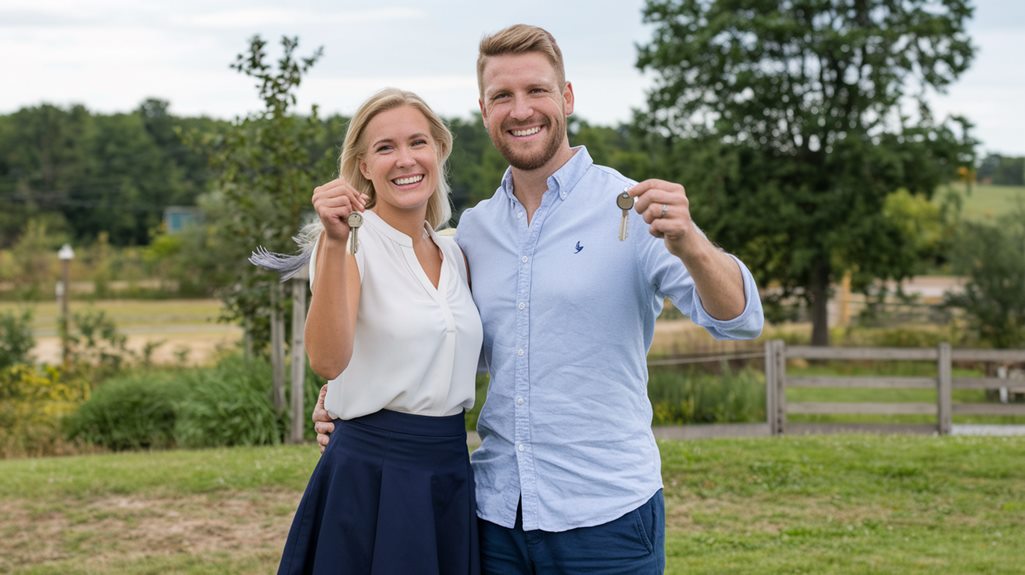If you are buying your first home, start by checking your money situation. Make sure to get a mortgage pre-approval. This means a bank will say how much money you can borrow. Look at how you spend your money and learn about closing costs so you won't be surprised later.
Next, think about where you want to live. Look at different neighborhoods and see what homes are selling for. Think about the things you really need in a home and what would just be nice to have. This will help you find the right place faster.
It's also a good idea to work with a real estate agent. They know a lot about the market and can help you when you need to negotiate, especially during home inspections. This can help you get a better deal.
Each step you take will help you find a great home. The more you learn, the better your chances of making a good choice!
Ready to start building equity in your own Michigan home? Get your personalized home loan quote today.
Assess Your Financial Health

Before you start looking for a home, it's important to check your money situation. First, look at your credit score. This number helps banks see if they can trust you to pay back a loan.
Next, make a plan to manage your debts. Lowering what you owe can help you get a loan more easily.
Also, create a savings plan to help you save for a down payment. This is the money you need to buy your home. It's smart to save some extra money for surprises, too. This is called an emergency fund. It helps you handle unexpected costs without losing your chance to own a home.
Keep track of your spending to see where your money goes. This can help you find ways to save more.
Michigan residents, unlock the door to your new home. Request your home loan quote from Treeside Financial today.
Get Pre-Approved for a Mortgage
To help you buy a home, getting pre-approved for a mortgage is very important.
First, think about how much money you can spend. This will help you find homes that fit your budget and keep you from spending too much.
Next, look at different lenders to find the best interest rates and terms. Make sure you have all your papers ready, like your pay stubs and tax returns. This will make getting your mortgage easier and faster.
Understand Your Budget
Buying a home can be tricky, but understanding your budget is really important. Start by getting pre-approved for a mortgage. This means a bank will tell you how much money you can borrow.
Next, take a good look at your money. Write down how much you earn and what you spend each month. Keeping track of your expenses is key. You can use apps or a simple notebook to see where your money goes. This helps you find places to save.
When you know your spending, it shows you're responsible with money, which can help you when talking to sellers. It's also important to know how much you can borrow. Lenders look at your debts compared to your income to decide how much money they can lend you.
When you understand your budget, you can make good offers on homes without going over your limits. With your pre-approval, you show sellers that you're serious about buying. This can give you an edge when negotiating.
It helps you feel like you belong in the home buying world, making your dream home feel closer to reach!
Compare Lender Options
Finding the right lender for your mortgage can feel tricky, but it's really important for getting good terms. Here are some simple tips to help you choose the best lender:
- Look around: Talk to different lenders to see their offers. This way, you can find the best deal.
- Check their help: A lender who's nice and helpful can make the whole process easier for you.
- Explore your choices: Make sure the lender has different types of loans. This way, you can find one that fits your needs.
Remember, a good lender has a strong reputation. This means they're reliable and trustworthy.
Also, pay attention to interest rates because even a small difference can change how much you pay each month.
Gather Necessary Documents
When you want to get a mortgage pre-approval, it's important to gather all the papers you need. This helps speed up your application. Lenders have a list of documents they want to see, like tax returns, pay stubs, W-2 forms, and bank statements.
By collecting these papers, you make it easier to get approved and show that you're serious about buying a home. Knowing what the lender needs and keeping everything organized can help you negotiate better.
If you work hard to gather these documents, it can make the approval process smoother and might even get you better terms. So, it's important to be ready and have every item on the checklist prepared.
This way, you can confidently move through the mortgage process and get closer to becoming a homeowner.
Research Potential Neighborhoods

When you're looking for a place to live, checking out different neighborhoods is really important. It can help you find the perfect home.
Here are some things to think about:
- Fun places nearby: Are there parks, stores, and fun spots where you can play or shop?
- Good schools: Even if you don't have kids, good schools can make houses worth more money.
- Home prices: Look at how much houses sold for recently. This can show you if prices are going up.
Taking the time to learn about the neighborhood can make buying a home a lot easier!
Identify Your Home Needs
After you look at different neighborhoods, it's time to think about what you really need in a home. This will help you find the right place. Think about how you live now and what you want in the future. Do you want a big house with space to grow, or a small condo that's easy to take care of?
It's important to know what you must have and what would just be nice to have. This can help you when you talk about prices. Here's a simple table to help you see what you want:
| Must-Haves | Nice-to-Haves |
|---|---|
| Close to work | Big backyard |
| Enough bedrooms | Office space |
| Good schools | Modern kitchen |
| Pet-friendly | Smart home stuff |
When you know what you want and how the market is doing, you can make a smart choice and find the best home for you.
Work With a Real Estate Agent

Working with a smart real estate agent can really help you find the best homes in your area. They know a lot about the market and can help you discover great deals.
Your agent will guide you through everything, from looking at houses to signing the final papers. This makes buying a home much easier.
Plus, they're great at negotiating, so you can get the best price and terms for your new home.
Finding Local Market Experts
When you want to buy or sell a home, having a local real estate agent can really help. They know a lot about the area and the current market trends, which helps you make smart choices.
An experienced agent can give you good advice just for you and help you through the tricky parts of buying or selling a house.
Here's why it's important to find someone who knows the local market:
- They Know the Area: They understand the neighborhoods and how much homes usually cost.
- They Are Good at Negotiating: They can help you get the best deal and handle offers and counteroffers easily.
- They Have Connections: They know people who can show you special listings and homes that aren't on the market yet.
Navigating Home Buying Process
Buying a home can feel a bit confusing, like walking through a maze. But don't worry! With a good real estate agent by your side, you'll have someone to help you find your way. They will explain tricky words and help you keep track of important dates. Knowing how the market works is very important. Your agent knows all about price changes and what different neighborhoods are like.
| Key Aspect | Benefits |
|---|---|
| Real Estate Words | Makes hard words easy to understand |
| Buying Timelines | Helps you stay on track |
| Market Information | Helps you make smart choices |
Your agent is more than just someone who helps you buy. They are your helper and friend. With their knowledge, you will feel sure and ready to look for your perfect home. This teamwork helps you feel like you belong, making sure you're not just getting a house, but finding a place to truly call home.
Negotiating Best Possible Deals
Getting the best deal on your new home isn't just about luck; it's about knowing the market and being a smart negotiator.
Working with a good real estate agent can really help you out. They'll show you how to:
- Negotiate wisely: Learn what the seller wants and adjust your plan.
- Make counter offers: Figure out when to stick to your guns or add something extra to keep things moving.
- Understand the market: Use local information to back up your offers and find good deals.
Your agent is like a friend who knows a lot about buying homes. They help you feel confident in a tricky real estate world.
With their help, you can handle offers and counteroffers easily, making sure you get a home that's just right for you at a good price.
Conduct Thorough Home Inspections
A home inspection is super important! It helps you find hidden problems before you buy a house. With a good checklist, you can look for things like how strong the house is, if the heating and cooling work well, and if there's any water damage.
It's best to hire a certified inspector. They know a lot about the area and the rules for building.
If the inspector finds issues, you can ask the seller to fix them or give you some money off. This can save you a lot of money!
A careful inspection helps you feel good about your choice. When you check everything carefully, you can avoid big surprises later.
Understand Closing Costs

When buying a home, it's really important to understand closing costs. These are the extra fees you have to pay at the end of the buying process.
Many people who are buying a home for the first time often think these costs are smaller than they really are. Knowing what these costs are can help you plan better.
Here are some common closing costs you might see:
- Loan origination fees: This is money you pay the lender for their work.
- Title insurance: This helps protect you if someone says they own part of your property.
- Escrow deposits: These are payments you make ahead of time for property taxes and insurance.
Don't be afraid to talk about costs. You can often negotiate to lower them.
Talking to people who work in the real estate business can help you understand more and make the home-buying process easier. You'll be on your way to becoming a homeowner soon!







